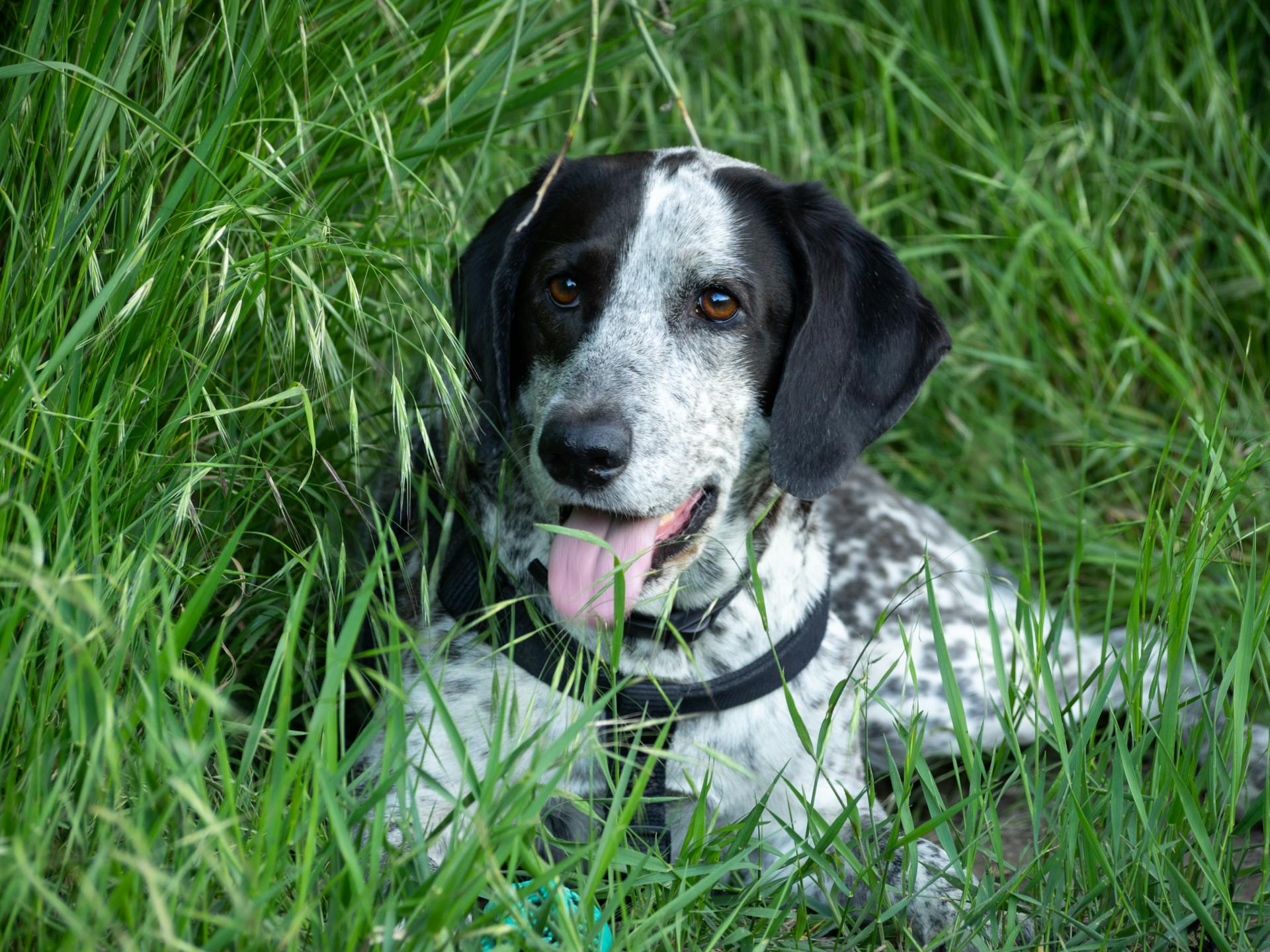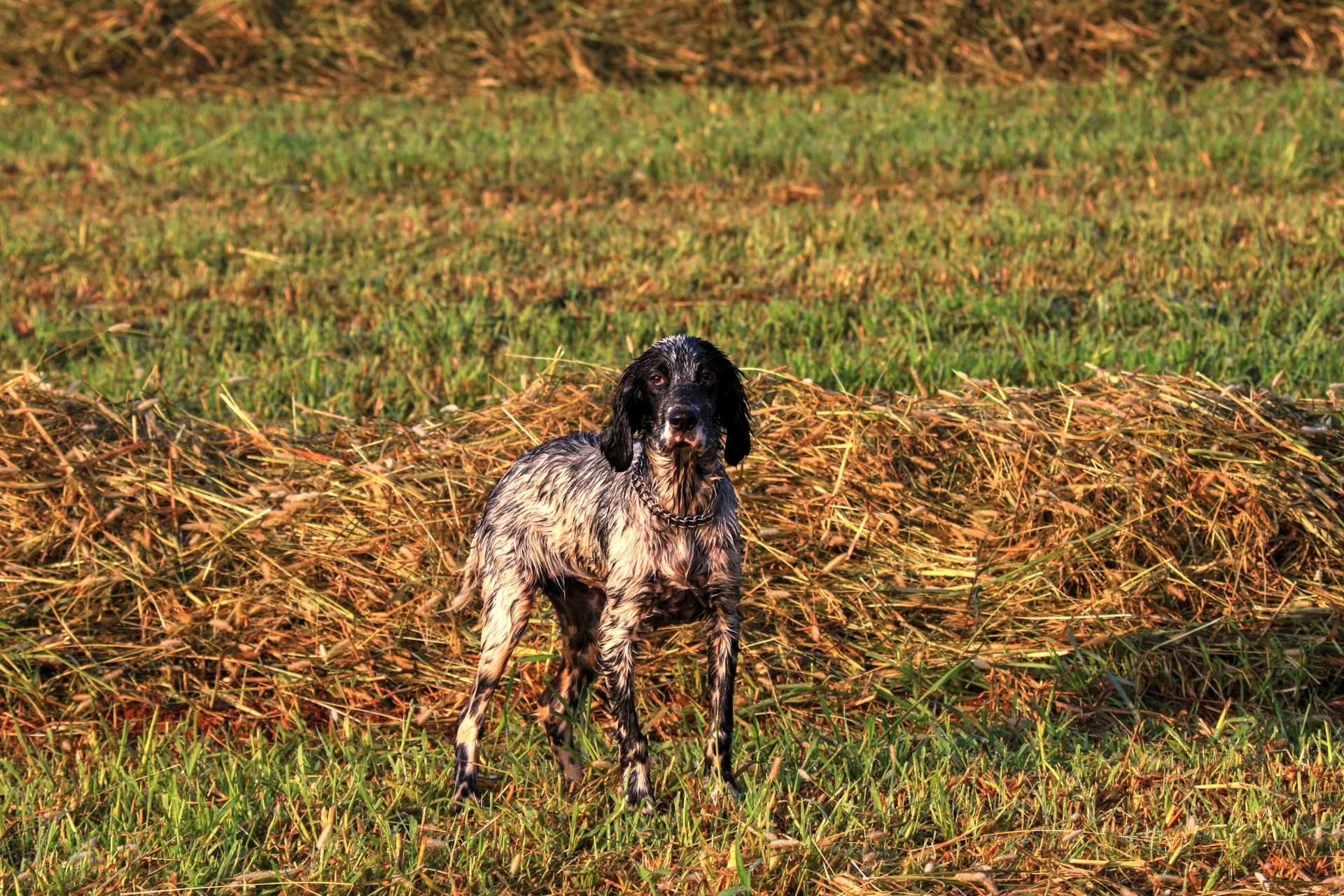
English Pointers are a beloved breed, known for their energetic and affectionate nature. They can live up to 12-14 years with proper care.
To ensure your English Pointer lives a long and healthy life, it's essential to be aware of potential health issues that can arise. One of the most common health concerns is hip dysplasia, which can lead to arthritis and mobility problems.
Regular exercise and a balanced diet can help prevent hip dysplasia. In fact, English Pointers require at least 30 minutes of exercise per day to stay happy and healthy.
Eye problems, such as cataracts and progressive retinal atrophy, are also a concern for English Pointers. These conditions can lead to blindness if left untreated.
Regular eye exams can help detect these issues early on, allowing for prompt treatment and prevention of further damage.
Consider reading: How Much Exercise Does a Cavapoo Need
Health Issues
English Pointers are generally a healthy breed, but like all pedigree dogs, they can be prone to certain health issues. While the risk is relatively low, it's essential to be aware of the potential problems that can arise.
Some common health issues in English Pointers include various forms of cancer, particularly in old age, and aortic stenosis, a heart condition caused by a narrowing of the aortic valve of the heart. This condition can lead to heart failure if left untreated.
English Pointers can also be susceptible to various types of allergies, including skin allergies, which can cause intense itching and hair loss. Hereditary epilepsy, hypothyroidism, and Wobbler syndrome are other potential health issues that can affect the breed.
Here's a list of some of the health issues that can affect English Pointers:
- Various forms of cancer
- Aortic stenosis
- Various types of allergies, including skin allergies
- Hereditary epilepsy
- Hypothyroidism
- Wobbler syndrome
- Osteochondritis of the shoulders
- Entropion of the eyes
- Hereditary cataracts
- Deafness
Joint Dysplasia
Joint dysplasia is a condition that affects the joints of Pointers, causing pain and lameness. It's a common health issue in the breed, and it's essential to be aware of the signs and symptoms.
Hip or elbow dysplasia occurs when the bones in the joints don't align perfectly, often due to inherited growth abnormalities. This misalignment causes pain and lameness in the affected joint.
The condition is diagnosed using x-rays to evaluate the alignment of the joints. In puppies, surgical correction can sometimes be helpful, but in many cases, the condition goes undiagnosed until the dog is fully mature.
Stiffness in the elbows or hips may become a problem for your Pointer, especially as they mature. You may notice lameness in their legs or difficulty getting up from lying down.
Treatable arthritis can be managed with medication and physical therapy, but in severe cases, surgery may be necessary. Keep in mind that overweight dogs may develop arthritis years earlier than those of normal weight, causing undue pain and suffering.
Here are some key facts to keep in mind:
- Hip or elbow dysplasia is a common health issue in Pointers.
- The condition is often inherited and can cause pain and lameness.
- X-rays are used to diagnose the condition.
- Surgical correction may be helpful in puppies, but in many cases, the condition goes undiagnosed until the dog is fully mature.
- Treatable arthritis can be managed with medication and physical therapy.
- Overweight dogs may develop arthritis years earlier than those of normal weight.
Bloat
Bloat is a serious health issue that can affect dogs. It's also known as GDV or gastric dilatation volvulus.
Dogs with deep, narrow chests are more at risk of bloat, which means breeds like Pointers are particularly vulnerable.
A dog that's bloating may retch or heave, but little or nothing comes up. They may also act restless, have an enlarged abdomen, or lie in a prayer position with their front feet down and rear end up.
If left untreated, bloat can be fatal in as little as half an hour. That's why it's essential to take your pet to an emergency hospital immediately if you see symptoms.
Preventive surgery can be an option to prevent bloat. This involves tacking down or suturing the stomach in place so it's unlikely to twist.
Consider reading: Little Dog Lifespan
Infections
Pointers are susceptible to bacterial and viral infections, just like all dogs, including parvo, rabies, and distemper.
These infections are often preventable through vaccination, which is recommended based on the diseases we see in our area, the dog's age, and other factors.
Many of these infections can have severe consequences if left untreated, so it's essential to stay on top of your Pointer's vaccination schedule.
Vaccination is a crucial aspect of maintaining your Pointer's health, and we'll work with you to determine the best vaccination plan for your furry friend.
Reproductive Difficulties
Breeds with a large head and small pelvis are more prone to difficulties during the birthing process.
A C-section is often required for the health of both the mother and her puppies, especially if the female's pelvis is too small to pass the puppies' heads.
If you're interested in breeding your English Pointer, it's essential to speak with a veterinarian or breeder first to discuss the potential reproductive difficulties.
A female Pointer's pelvis may be too small to pass puppies, making a C-section necessary for her health and the health of her puppies.
Breeding a large-headed breed with a small-pelvis female can lead to serious complications during delivery, so it's crucial to make an informed decision based on the body conformation of both the sire and dam.
Suggestion: Small Dog Seresto Flea Collar
Nutrition and Feeding
Feeding your English Pointer the right diet is crucial for their overall health and well-being. Choose a high-quality dog food that meets their individual needs, and consult with your veterinarian for guidance.
Pointers are active dogs and require a diet with a higher fat and protein ratio. This will help keep them energized and support their physical activity.
To prevent obesity, avoid overfeeding your Pointer, especially if they don't engage in extensive physical activity. Maintaining their proper body conditioning and weight is vital.
Pointers typically eat two meals a day, morning and evening. The evening meal should take place after their day's activities to help prevent Gastric Dilatation-Volvulus (GDV).
Following the feeding guide on the food bag is essential to ensure your Pointer is receiving the right essential daily nutrients. You can expect to feed them anywhere from 2 to 5 cups of dry food per day, given over two meals.
If your Pointer has hip or elbow dysplasia or luxating patellas, consider adding nutritional supplements with glucosamine and chondroitin to help keep their joints healthy.
A unique perspective: How to Prevent Diabetes in Dogs
Grooming and Care
Pointers have low grooming needs, requiring only an occasional bath when needed.
To keep their skin healthy and coat shiny, weekly brushing is essential, especially for average shedders like Pointers.
Regular nail trimming and gentle ear cleaning are also necessary to prevent problems.
Here's a quick rundown of what you should do for your Pointer's grooming and care:
- Brush their coat at least weekly
- Clean their ears weekly
- Trim their nails regularly
It's also crucial to brush their teeth at least three times a week, as Pointers often have serious problems with their teeth.
By following these simple steps, you can help keep your English Pointer happy, healthy, and well-groomed.
Mange
Mange is a common issue in dogs, and it's essential to be aware of the signs and symptoms. All dogs have Demodex mites living in their hair follicles, but some breeds develop an overabundance of them.
In mild cases, pet owners may notice dry, irritated, hairless lesions on their dog's face or feet, which may or may not be itchy. Secondary skin infections can occur if left untreated.
Prompt veterinary care is crucial to prevent the disease from getting out of hand. Many pets seem to outgrow the problem, while others require lifelong management.
Grooming
Grooming your English Pointer requires minimal effort, but regular attention to keep them clean and healthy.
Weekly brushing reduces shedding, and bathing is only necessary every few months to keep their skin healthy and coat shiny.
You can use a soft/medium bristle brush or your hands to remove dead hair, making grooming a gentle and enjoyable experience for your dog.
Regular nail trimming is also essential to prevent overgrowth, which can be painful for your dog.
To maintain your Pointer's healthy ear canals, routine cleaning with a veterinary-approved ear cleanser is vital, especially after swimming or bathing.
Here's a simple grooming schedule to follow:
- Brush their coat at least weekly
- Clean their ears weekly
- Trim their nails regularly
- Bathe them every few months
By following this schedule, you'll be able to keep your English Pointer clean, healthy, and happy.
Personality
Pointers are bred for their speed and endurance, so they need a lot of exercise to stay engaged.
A tired Pointer is a happy Pointer, and they love to snuggle up with their family members.
To meet their energy needs, Pointers require at least one to two hours of exercise a day, which should not be limited to walking.
Running, fetching, or agility games are great ways to exercise their mind and body.
Expand your knowledge: How Much Exercise Do Labrador Retrievers Need
Breed or Spay/Neuter?
Breeding your Pointer is a tremendous responsibility, requiring a considerable time and financial investment to properly raise a litter. Pointers have large litters, and often can be hard to place because they are not one of the more popular breeds.
Unless your Pointer is an exceptional representative of the breed, it's essential to consider spaying or neutering. Spayed or neutered Pointers may participate in all AKC events except conformation.
Spaying or neutering your Pointer can greatly reduce the risk of certain health issues, such as uterine cancer or breast cancer in bitches, and testicular cancer in males.
For more insights, see: Canine Cancer Awareness
General Information
English Pointers are a relatively healthy breed, but like all dogs, they can be prone to certain health issues.
Hip dysplasia is a common concern for English Pointers, with 24% of males and 21% of females affected by the condition.
Hip dysplasia can lead to arthritis and mobility problems, making it essential to monitor your dog's joint health and keep them at a healthy weight.
English Pointers are also susceptible to eye problems, with 14% of the breed affected by cataracts and 12% affected by progressive retinal atrophy.
You might enjoy: English Pointer Mixed Breed
General Information

General Information is a broad term that encompasses a wide range of topics.
The term "General Information" itself is often used to describe information that is not specific to a particular field or topic, but rather is general knowledge that can be applied to various situations.
General Information can be found in many different formats, including books, articles, and online resources.
The internet has made it easier than ever to access General Information, with a vast array of websites and online databases available at our fingertips.
In fact, according to recent statistics, the average person spends over 4 hours per day browsing the internet, with many of those hours spent searching for General Information.
This highlights the importance of being able to effectively search for and evaluate General Information online.
While it's tempting to rely solely on online sources, it's also important to verify information through multiple sources to ensure accuracy.
Spay or Neuter
Spaying or neutering your Pointer is one of the best things you can do for their health and well-being.
Spaying or neutering decreases the likelihood of certain types of cancers and eliminates the possibility of your pet becoming pregnant or fathering unwanted puppies.
In females, spaying means surgically removing the ovaries and usually the uterus, while in males, neutering means surgically removing the testicles.
Performing this surgery also gives us a chance to identify and address some of the diseases your dog is likely to develop, such as hip problems or dental issues.
Routine blood testing prior to surgery helps identify and take precautions against common problems that increase anesthetic or surgical risk.
This is a good opportunity to have any necessary procedures done at the same time, making it more convenient for you and easier on your pet.
Take a look at this: Preventative Care Keeping Your Pet Healthy Year-Round
Frequently Asked Questions
What is the life expectancy of an English Pointer?
English Pointers typically live between 12-17 years, making them a relatively long-lived breed. However, like all breeds, they can be prone to certain health issues.
Sources
- https://www.petmd.com/dog/breeds/pointer
- https://www.carsonvet.com/services/dogs/breeds/pointer
- https://familyfriendsvets.com/client-resources/breed-info/pointer/
- https://www.americanpointerclub.org/raising-an-amazing-pointer/
- https://www.pets4homes.co.uk/pet-advice/pointer-dog-hereditary-health-and-health-testing.html
Featured Images: pexels.com


